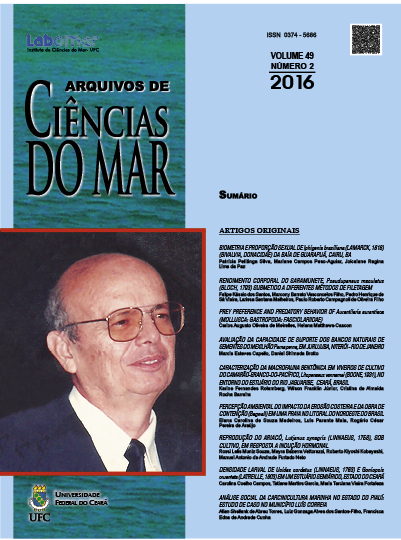Social analysis of marine shrimp culture in the state of Piaui: case study in the municipality of Luis Correia
DOI:
https://doi.org/10.32360/acmar.v49i2.6584Keywords:
aquaculture, regional development, socioeconomic ccharacteristics.Abstract
This study aims to analyze the importance of the marine shrimp farming for workers and communities near a shrimp farm in the municipality of Luis Correia (PI) by socioeconomic characterization and perception of changes in the social, economic and environmental aspects from the establishment of the farm. Thus were prepared two questionnaires, one addressed to employees (55) of the farm and another for residents (57) of the villages around the firm. The group of residents interviewed consisted mostly of women, low level of schooling, developing domestic and informal activities, with no fixed income, while the group of male employees, for the most part, also presented low level of schooling, but formal link, remunerated with 1 basic salary. Regarding the perception of the residents and employees about the shrimp farm, it was verified that the majority of the interviewees of both groups identified an increase of the formal employment offer in the region; the majority of both groups did not perceive environmental changes, although a greater percentage of alterations was perceived by the group of residents (33.3%). As for the social actions carried out by the shrimp farm, he was cited to school maintenance as one of the most important. The level of satisfaction regarding the introduction of this activity was greater in the group of employees interviewed with 58.2%, possibly due to the employment relationship of these people with the company. In this study, it can be suggested that the shrimp farm contributes with improvements in the standard of living, since it contributes to the generation of employment and income, besides helping in the access to education.Downloads
Downloads
Published
2017-05-05
How to Cite
Torres, A. S. de A., dos Santos Filho, L. G. A., & Cunha, F. E. de A. (2017). Social analysis of marine shrimp culture in the state of Piaui: case study in the municipality of Luis Correia. Arquivos De Ciências Do Mar, 49(2), 84–91. https://doi.org/10.32360/acmar.v49i2.6584
Issue
Section
Artigos originais
License
1. Proposta de Política para Periódicos de Acesso Livre
Autores que publicam nesta revista concordam com os seguintes termos:
- Autores mantém os direitos autorais e concedem à revista o direito de primeira publicação, com o trabalho simultaneamente licenciado sob a Licença Creative Commons Attribution que permite o compartilhamento do trabalho com reconhecimento da autoria e publicação inicial nesta revista.
- Autores têm autorização para assumir contratos adicionais separadamente, para distribuição não-exclusiva da versão do trabalho publicada nesta revista (ex.: publicar em repositório institucional ou como capítulo de livro), com reconhecimento de autoria e publicação inicial nesta revista.
- Autores têm permissão e são estimulados a publicar e distribuir seu trabalho online (ex.: em repositórios institucionais ou na sua página pessoal) a qualquer ponto antes ou durante o processo editorial, já que isso pode gerar alterações produtivas, bem como aumentar o impacto e a citação do trabalho publicado (Veja O Efeito do Acesso Livre).

